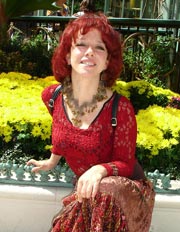
Lubov was born in St. Petersburg, Russia. Anxious for cultural and political freedom, Lubov immigrated to the United States. This move caused her to adapt to a culture very different than the one she had known. Although she has very few good memories of her youth while in Russia and of her move to the US, her early adversities forged a great strength of character that would benefit her for the rest of her life. It is this strength of character and her tenacious hold on truth that abounds in her art. Perhaps oddly, it is the art of the fantastic - fantasy, phantasmagoric - that draws Lubov's imagination and her skills as an artist. Her work has its own voice. It stands outside the cacophony of commercial art, the core purpose of which always will be to sell you something you don't necessarily need. Lubov studied art at the Chicago Art Institute, one of the most prestigious schools in the country, but she maintains that her true knowledge of art - her sense and sensibility - comes via her own studies. Lubov's work is singular in both imagination and execution. There is technical mastery in her work; mastery in the sense of the old masters. Lubov's art is a return to the pre-Raphaelites' storied imagination, a thesis of art that resonates for Lubov. (Lubov's artistic inspirations include Adolphe-William Bouguerau, John W. Waterhouse, Maxfield Parrish, Sir Lawrence Alma-Tadema, Victor Mikailovich Vasnetsov, Arkhip Kuinji, Alphonse Mucha, and Rembrandt.) Lubov paints with oils, the most difficult painting medium of all. The technique itself is six hundred years old and nothing since devised can match the sheer power of this very human mode of expression when handled by such an expert. Art never was about mere self-expression; it is all about emotion. Art is the expression of the universal self; the human experience to which each person can relate. Of course, there exist many levels to art - its context, sub-text, and hidden text, or message - but if art requires explanation then it has failed. Lubov shows us, the appreciators of her art, understanding and appreciation by using the story of her painting and the wizardry of her technique. There exists in her work that indefinable something that conveys simultaneously both perfect innocence and vast wisdom. These rather contradictory qualities are found in the artist herself. Lubov is young and old; wise beyond her years. To view her work in the proper manner, it might be simplest to think of her as a classical painter exploring the human condition through the scrim of the fantastic. Though still young, Lubov has the certain potential to become a master in the classic sense. It is your opportunity to enjoy, appreciate, and even collect Lubov's work now, before the world's great museums recognize her magnificent talent. |